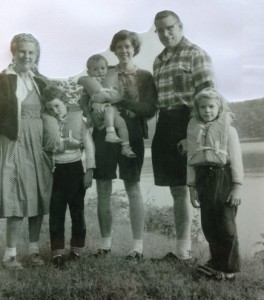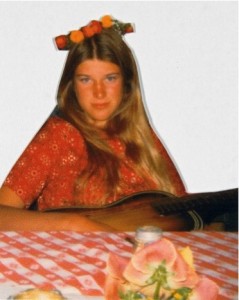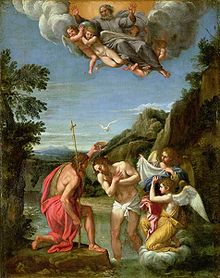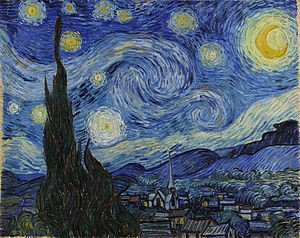 You see that little girl? The one on the right? Yes, it’s me. I was six and a half years old that summer. That’s right—the girl in the lifejacket, the one who wanted life to be safe.
You see that little girl? The one on the right? Yes, it’s me. I was six and a half years old that summer. That’s right—the girl in the lifejacket, the one who wanted life to be safe.
Some of my family’s pictures reveal a time in my life when I was free to be a child in a child’s world. Utterly unselfconscious. I was given that privilege, that chance to grow up naturally, slowly, as a flower opens in the spring.
 But that time of innocence melted away. I soon became a contemplative teenager, and a very different world emerged. I saw pain in other people’s faces. I heard traumatic stories. I learned about abuse, divorce, racism, prostitution, drug overdoses, mental illness, and death. Where was God in all the chaos and tragedy?
But that time of innocence melted away. I soon became a contemplative teenager, and a very different world emerged. I saw pain in other people’s faces. I heard traumatic stories. I learned about abuse, divorce, racism, prostitution, drug overdoses, mental illness, and death. Where was God in all the chaos and tragedy?
I wanted to be safe and keep others safe too, but life jackets would not suffice.
How does one reconcile the idea of a loving God with the pain in human existence–particularly when it comes to unjust suffering? Is it brazen to think God isn’t doing a good job of being God? How can you get close to Him, if you don’t trust Him? Those deep brooding questions were tucked away in the dark places of my heart, even though I’d been a Christian for a while.
And those are Iris Somerset’s questions too.
 Iris is the main character in my newly released novel, Bird, Horse, and Muffin. She’s ten years old. Ten and a half to be precise. Half years are important when you’re keeping up with a snarky teenage brother like Wyeth.
Iris is the main character in my newly released novel, Bird, Horse, and Muffin. She’s ten years old. Ten and a half to be precise. Half years are important when you’re keeping up with a snarky teenage brother like Wyeth.
God speaks to her for the first time in a school parking lot. From that point on, her family life begins a nosedive. Yet her spiritual curiosity is stirred. God brought her terrible news. Still God was the One Who told her. How intriguing and confusing to a young girl with a heart full of questions?
My editor, Mick Silva, wrote me during the writing process. “You know you’re Iris, right? You get that don’t you?”
I tilted my head. It was a curious thought. I didn’t lose my mother at a young age. My father wasn’t anything like Hank, Iris’ father, and I didn’t have a volatile older brother to contend with. But in truth, my spiritual questions were the same. I wrote back. “Well, yes. You’re right. Maybe she’ll figure things out for me.”
 Story writing is like that. As an author, I was laying out my own questions and struggles, my own vulnerabilities and dismay that life is different than I’d hoped for. I searched for answers and pressed into God when I came up empty. At times my characters took me places and showed me a few things. And some of my own questions resolved.
Story writing is like that. As an author, I was laying out my own questions and struggles, my own vulnerabilities and dismay that life is different than I’d hoped for. I searched for answers and pressed into God when I came up empty. At times my characters took me places and showed me a few things. And some of my own questions resolved.
 Mostly I hope this story will resonate with those who have lost a parent, or have had to grow up too quickly, or lived under the instability of alcoholism. I want to show a real God in the midst of human loss–that when you reach your absolute rock bottom, God is there.
Mostly I hope this story will resonate with those who have lost a parent, or have had to grow up too quickly, or lived under the instability of alcoholism. I want to show a real God in the midst of human loss–that when you reach your absolute rock bottom, God is there.
Still one has to choose between despair and faith. It’s not an easy choice. Despair is the shipwreck of the soul, and the journey of faith is often without a clear path. As a kid might say, it’s a choice between worse and worser. And yet along the way—through faith—the unseen becomes more real than what is seen. And that brings hope—the kind of hope that lights the way.
 As Uncle Skeets explains to Iris in the story—“To go on with God, you have to be willing to walk in days of mystery.”
As Uncle Skeets explains to Iris in the story—“To go on with God, you have to be willing to walk in days of mystery.”
All the God encounters in my novel are based on true stories, lending authenticity to the ways God enters our human struggle.
May you have your own encounter with God as you read the story!
Bird, Horse, and Muffin is available now on Amazon and Kindle. If you’d like to be part of my “Street Team” and help put out the word on social networking, write me at sdhill747@hotmail, and receive a free, signed copy. With 5,000 new books printed every day—900 alone in the U.S.—the only way to extend the reach of my message is through word of mouth. Your help would involve less than an hour of time and would be greatly appreciated! Enjoy the fabulous book trailer created by Filmmaker Scott Chestnut with the help of my son, Nate!















